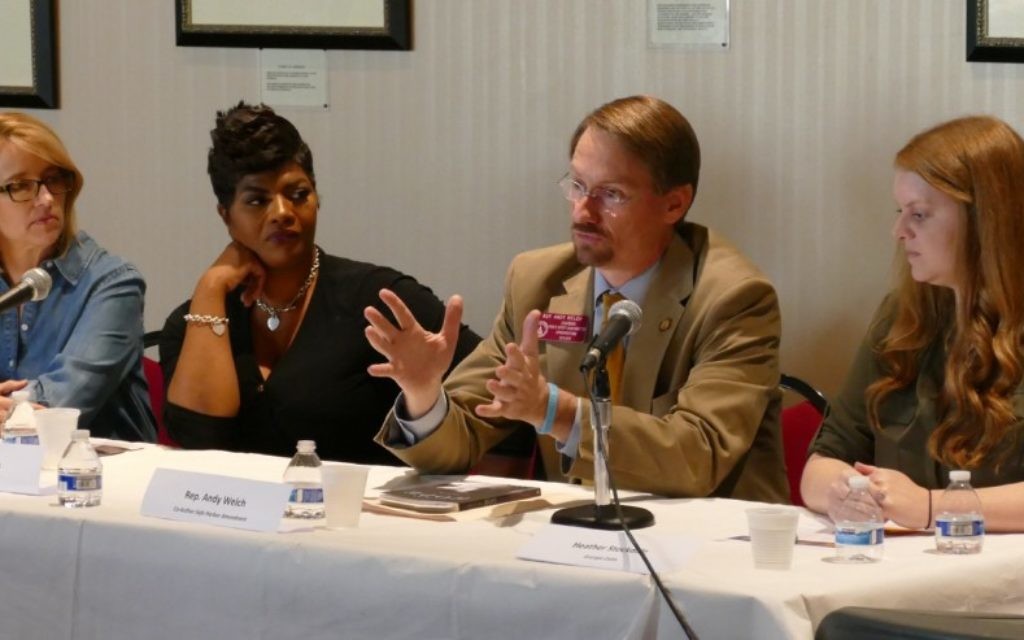Amendment 2 Promises Path Back for Sex Victims

Amendment 2 on the Nov. 8 ballot is a one-time opportunity for Georgians to counter the damage done by child sex trafficking.
That was the message promoted by a panel discussion about the proposed Safe Harbor amendment to the Georgia Constitution on Sunday, Oct. 30, at Ahavath Achim Synagogue.
“I am proud of this legislation, and I am proud of what it will do to help rescue children,” said state Rep. Andy Welch (R-McDonough), who was one of the writers and co-sponsors of the 2015 legislation ensuring that children used in the sex trade would be treated as victims and authorizing a system to pay for restorative care for those victims.
Get The AJT Newsletter by email and never miss our top stories Free Sign Up
“We as taxpayers haven’t put up one state dollar to help these children,” Welch said. “I personally found that repulsive.”
Amendment 2 would dedicate sources of revenue for the Safe Harbor for Sexually Exploited Children Fund: fines on the criminals and assessments on “adult entertainment establishments,” which Welch said means any strip club where alcohol is sold or may be brought in. Without dedicated funding, estimated to total $2 million in 2017 under current legislation, the Safe Harbor fund would be subject to legislators’ whims.
“We are speaking of violence born of power and its misuse,” Ahavath Achim Rabbi Neil Sandler said in welcoming the interfaith crowd of about 40 people.
He tied the passage of Amendment 2 to tikkun olam, the repair of the world, as part of our ongoing role as G-d’s co-creators.
He and other speakers emphasized that while the Safe Harbor amendment is crucial, it is only one step toward the goal of eradicating the scourge of child sex trafficking.
Heather Stockdale, the executive director of Georgia Cares, the statewide coordinating agency for child victims of sex trafficking and exploitation, said sex trafficking is not limited to inner-city Atlanta but occurs in all 159 of Georgia’s counties.
“This is an everywhere issue,” she said, explaining that the fact her agency is working with victims from only 104 counties reflects a lack of awareness in some counties, not the absence of the problem. Georgia Cares helped 469 victims in the past year, said Stockdale, who estimated that only 1 percent of victimized children are rescued.
Susan Norris, the founder and executive director of Rescuing Hope, said her organization is helping to rescue those victims by training teachers, law enforcement officers and others who deal with children to recognize the warning signs.
Dorsey Jones, who was used for sex from the age of 11 by neighbors in Bainbridge, shared her story to demonstrate how “the life” of the sex industry not only can be forced on a child by circumstances of deprivation and low self-esteem, but also can twist that child’s perceptions and decision-making.
Jones, a Morris Brown College graduate and author of the memoir “Stretched Beyond Measure,” noted that after she ran away at age 12, hitchhiked to Norfolk, Va., where she had lived until age 6, and miraculously found relatives to take her in and offer her a loving home, she sneaked back to Bainbridge and the sex life because she felt guilty being cared for while her younger siblings remained in an abusive home.
“It shouldn’t hurt to be a kid,” she said.
It typically takes 2½ to three years of treatment and care, costing about $9,000 a year, for a survivor of sex trafficking to recover, Stockdale said. The projected revenue for the Safe Harbor fund in 2017 would cover about half the costs.
As a result, the commission administering Safe Harbor grants will always need to form partnerships with synagogues, churches and other organizations to care for the victims, Welch said, and that’s a good thing because it ensures more openness and public oversight of the commission’s work.
The Question
“Shall the Constitution of Georgia be amended to allow additional penalties for criminal cases in which a person is adjudged guilty of keeping a place of prostitution, pimping, pandering, pandering by compulsion, solicitation of sodomy, masturbation for hire, trafficking of persons for sexual servitude, or sexual exploitation of children and to allow assessments on adult entertainment establishments to fund the Safe Harbor for Sexually Exploited Children Fund to pay for care and rehabilitative and social services for individuals in this state who have been or may be sexually exploited?”




comments